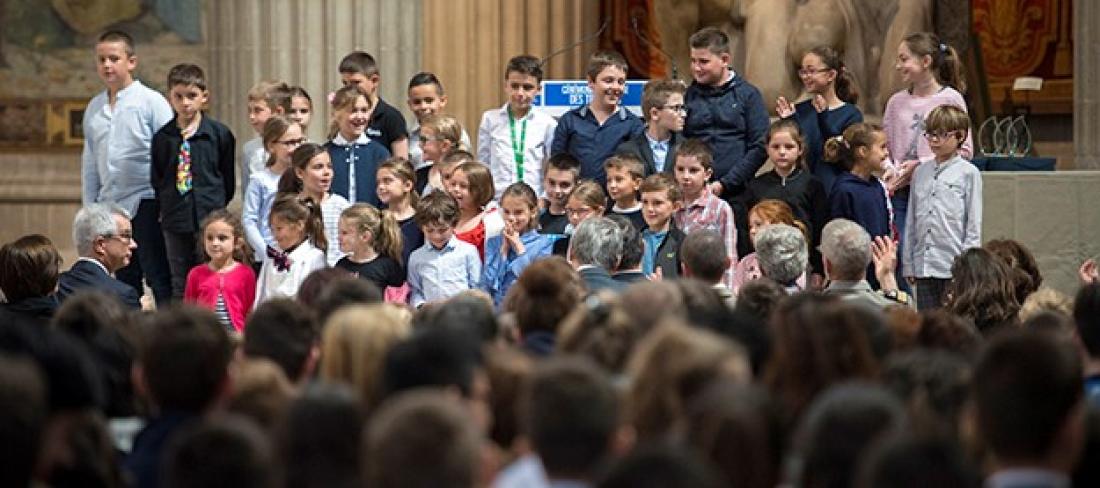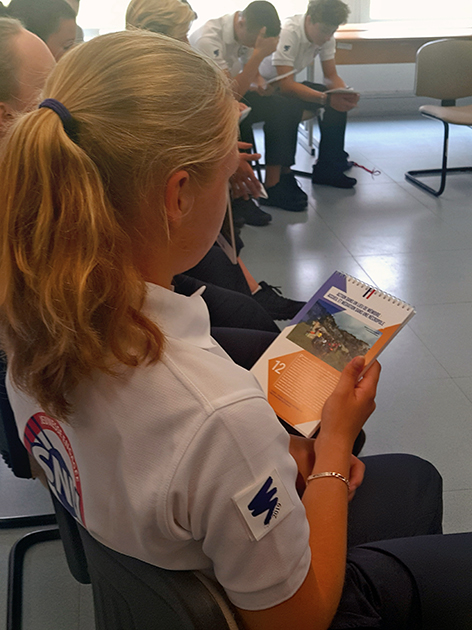The place of school pupils

The major commemorative cycles provided an opportunity to see just how heavily teachers and students have become involved in remembrance activities. Aware of that involvement, the Ministry of the Armed Forces, working closely with education and agricultural training services, endeavours to offer them the means and resources they need to develop learning initiatives focusing on remembrance.
Passing on the memory of past events is a particularly important issue; it is a factor of cohesion between generations and reinforces, in a living, tangible way, the link between young people and the nation.
Giving ceremonies back their meaning
School pupils have always been associated with remembrance, especially through their participation in ceremonies. For several years now, the Directorate for Heritage, Remembrance and Archives (DPMA) has been working with teaching staff to make these young people protagonists rather than spectators of the commemorations. Their presence at national ceremonies takes the form of active participation, for example by reading out texts and first-hand accounts, and is always accompanied by class topic work that underpins their participation.
Recent examples include the involvement of two classes, from Castres and Agen, in the ceremony of inauguration of the Memorial to French soldiers killed in overseas operations, at Parc André Citroën, Paris, on 11 November 2019.
In 2020, with the health crisis preventing ceremonies from being held in their customary formats, a call for contributions to the 80th anniversary of 1940 was launched, in partnership with the education ministry, to encourage young people to seize this memory and play an active role in its commemoration.
This active participation in ceremonies and major commemorative cycles is not the only sign of their involvement in the essential task of remembrance, which takes place first of all in class.
Supporting schools’ involvement
A few figures show the growing involvement of schools: between 2013 and 2018, nearly 2 000 educational project were labelled by the French WWI centenary commission, the Mission du Centenaire. In the same period, the DPMA provided financial support to 950 projects about the First World War.
In 2019, nearly 1 000 projects with an educational dimension (double that of four years earlier), including nearly 800 directly presented by schools, received financial support from the DPMA, with over 80% of them including a trip to a remembrance site. Encouraging visits to the sites also contributes to ensuring that the memory of contemporary conflicts is passed on, since the educational offerings of the sites complement what is taught in the classroom.
The support also includes the provision of learning resources, via the digital defence education platform, Educ@def, which has been significantly expanded since lockdown restrictions began.
A key stage in the citizenship pathway, passing on the memory of contemporary conflicts, through defence education, warrants innovative actions to ensure a lasting impact for this fundamental work carried out by primary and secondary schools and colleges.

Young volunteers take part in the Universal National Service “Remembrance” module, June 2019. © Rights reserved
Innovative learning approaches
By launching calls for educational projects each autumn, the DPMA encourages a multidisciplinary approach, inviting teachers to draw on music, sport or literature to complement the historical approach. Themes like “War reporters”, “War landscapes”, “The Little Prince explores Defence” or “Marie Curie: science and war” offer fresh perspective on contemporary conflicts and the memories associated with them.
This educational approach addresses all pupils, as it is essential for remembrance work to start early and to cater for different age groups, including primary school age.
For example, in 2018, primary pupils of Saint-Exupéry school in Vauvillers produced a DVD and comic book telling the story of the meeting between the Little Prince and airman Georges Guynemer; in 2019, students of the French lycée in Casablanca made a film about the involvement of Moroccan soldiers in the two world wars, in which they read out letters from spahis and tirailleurs sent to the front, which they had thought up and written in Arabic; and in 2019-20, students at Rethel agricultural college took part in a beginners’ photography workshop with a professional photographer, at the Butte de Vauquois site.
Another area in which the DPMA has shown innovation is in the recognition of students’ work. Since the 2016-17 school year, as part of the “Heirs of Remembrance” programme, the Établissement de Communication et de Production Audiovisuelle de la Défense (ECPAD) has produced three documentary films on the most outstanding educational projects. This action has put the spotlight on young people’s involvement and given a second life to their projects. In another example of recognising class project work, in 2017-18 the DPMA devoted an issue of its publication, Les Chemins de la Mémoire, to final-year students of the Lycée de la Communication, in Metz. It offered them the chance to share their thoughts on the Holocaust and how it should be remembered today.
Finally, an innovative approach has been taken to developing the content of the Universal National Service (SNU) “Defence and Remembrance” module, which was previewed in 2019. The module raises young people’s awareness of commemorations by means of a fun activity structured around the ceremonial ritual, devised by the ONAC-VG. After this bonding activity, they are invited to carry out a community service assignment, which can be one of any number of projects at remembrance sites, in ceremonies or with veterans’ associations, aimed at bringing to life and passing on national memory. The learning content of the SNU “Defence and Remembrance” module was the focus of a consultation with lycée students to find out their views, a participatory initiative that will be repeated in the school year 2020-21 for other learning activities, as part of a “remembrance lab”.
The editorial team

